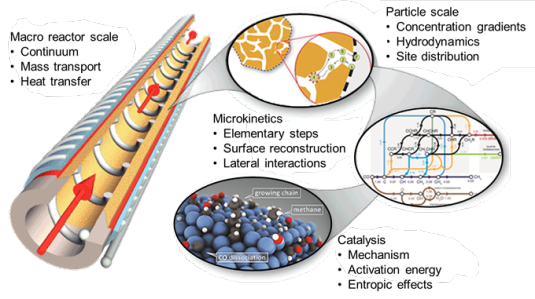Kinetics and mechanism syngas chemistry


Synthesis gas is an increasingly important platform for conversion of carbon-containing feedstock to fuels and chemicals, with the Fischer-Tropsch process to convert natural gas to transportation fuels being commercialized by several industrial partners. This reaction is very complex because the mechanism has not been resolved yet. Many proposals exist for it and under industrial conditions hundreds of elementary reactions are involved in obtaining the polymerized products. In this project, we will combine a nanoscale description of the individual reaction steps in the Fischer-Tropsch reaction obtained by quantum-chemical calculations with a reactor engineering model to predict the overall catalyt performance. This holds the promise of identifying how to improve the current generation of catalysts towards optimum performance. The tool that we develop is also applicable to other processes so that we can also make predictions for instance for the production of chemicals from synthesis gas. The project uniquely combines work at the level of reacting molecules, phenomena at the millimeter level in catalyst bodies and at the meter-length scale in chemical reactors.
Project leader: Prof. Emiel Hensen




















